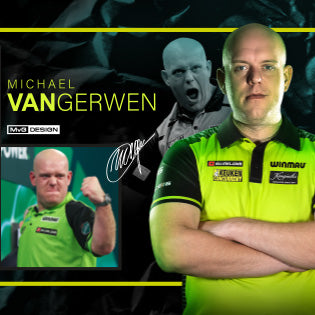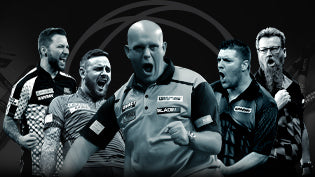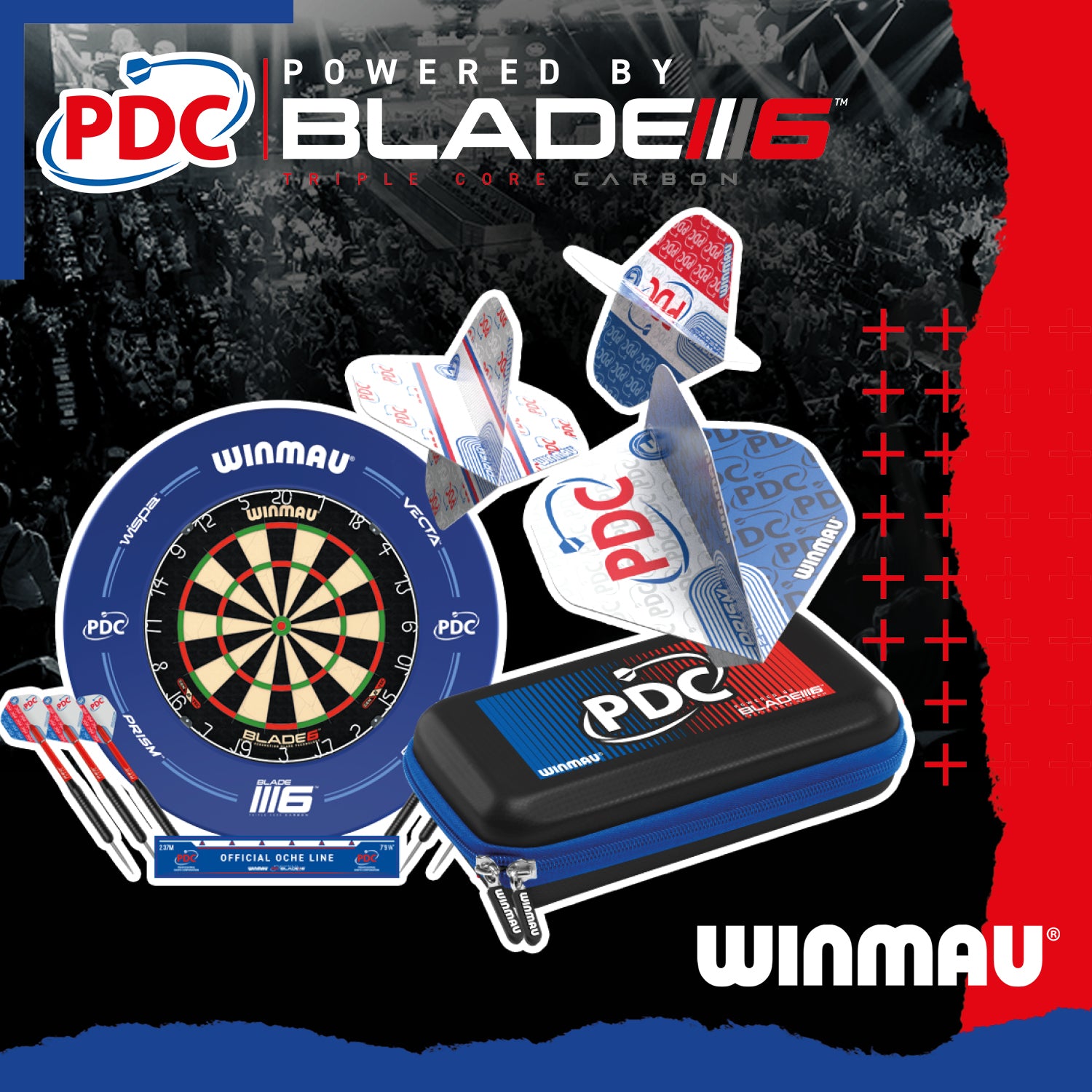
DR DARTS NEWSLETTER - PATRICK CHAPLIN - FEBRUARY'25 EDITION
DARTS HISTORY
(formerly Dr. Darts' Newsletter)
Issue 179 | www.patrickchaplin.com | February 2025
ONE HUNDRED YEARS OF DARTS ORGANISATION
THE NATIONAL DARTS ASSOCIATION (NDA) -- PART ONE
'When the [National Darts] Association was formed...there were only eight [darts] leagues in existence...now there are nearly 200 affiliated to the N.D.A... More than a quarter of a million players are registered with the N.D.A. and the number playing the game 'unofficially' must run into millions.' [Charles W. Garner, 'DARTS: from village inn to Mayfair,' Radio Times, 18 June 1937.]

Many darts fans might think that the formal organisation of darts began with the BDO (British Darts Organisation) in 1973. That was certainly when the game received an amazing jab in the arm which led to the second 'boom' of darts in the 20th Century.
Thinking even further back, older darts players may remember the formation of the National Darts Association of Great Britain (NDAGB) which grabbed hold of the loose reigns of darts organisation in 1954 and lasted until being trampled underfoot by the BDO juggernaut in the early 1980s.
But no. The organisation of darts began in 1924 and it was in 1925 that the National Darts Association (NDA) was formalised. ONE HUNDRED YEARS THIS MONTH.
On Thursday 12 February 1925 a group of professional men met in the offices of the Morning Advertiser in London to discuss the establishment of an English darts association for the control of the game of darts and for unifying the rules. Thus, it might be imagined that their motives were similar to those of other members of the elite who, during the innovative and expanding world of mid-Victorian leisure, had met to organise and codify athletic sports, mainly track and field, to reconstruct football and to reform cricket: their primary aim through rational recreation being to 'forge more effective behavioural constraints' in leisure.
(The line-up of NDA committee members and the Licencees Charity Cup Committee shown above, in 1927 includes Charles W. Garner, Hon. Sec. of the NDA, second from the left and Ted Leggatt, founder of the NODOR Dartboard Co., is shown, darts in hand, fourth from the left, with other members of the NDA and the Executive Committee.) (Image © NODOR. Used with permission.)
The NDA was a more complex organisation although it fulfilled the requirement of codification that accompanied all major sports, games, and pastimes. The rules and principles laid down by the NDA in 1925 remain at the very heart of darts across the world today. The NDA needs to be seen in the context of a wider associational culture that had shaped leisure for more than one hundred years previously.
In addition to the aims of controlling darts and bringing respectability to the game, the threat from alternative leisure forms was to be a prime motive for the establishment of the National Darts Association.
Whilst the fundamental principle of control was inherent in the rules of the NDA, the Association was more concerned with protecting the game from external influences who might utilise darts for illegal gain, thus bringing respectability to darts especially in the context of the improvement of English public houses, than directly promoting darts as a developing sport to compete against, say, football or cricket.
By the early 1920s darts was already largely the working-class pastime and thus any thought of social exclusion was meaningless.
The NDA's motives were to consolidate darts as a popular recreation in public houses as a counter attraction to alternative leisure options including not only other sports but also the cinema and dance halls. The NDA played a pivotal role in the development and expansion of the game of darts as an organised recreation in public houses during the interwar years.
Whilst the brewers provided the premises and financial backing in the form of provision of equipment and prizes, the NDA was responsible for the application of rules and the popularisation of darts in pubs across the country. Ironically, during the mid-to-late 1930s, the NDA managed to achieve social inclusion as darts found favour with the middle and upper classes as a popular form of novelty recreation.
Also, the NDA engaged in close working relationships with the News of the World, the first national Sunday newspaper to sponsor darts.
Until the 1920s, darts had been developing in English public houses in an ad hoc way with different styles, sizes, and designs of dartboards, differing rules of play and with relatively low levels of participation. However, during the interwar period, the game was transformed by the NDA into one of the most popular participative recreations in England. Until then darts was one of many pleasant, participative diversions for the working class -- both team and individual -- to be found in some, but by no means all, English public houses.
Depending on the locality in which it was played, darts received little or no attention or support from brewers. However, during the early 1920s, darts playing became increasingly popular and forces came into play that would revolutionise darts' role in English, rather than British, society thus enabling it to evolve into a key element of mass leisure in parallel to, and in competition with, other forms, including the cinema, in the country during the interwar years.
It would be easy to state that the NDA was an association born of the licensed trade which simply imposed rules on the working-class pub-goer, but the situation is in fact much more complex. In essence, the formation of the NDA was a response to both the demands from licensees for regularisation of the game and from the brewers who, as part of their on-going schemes of public house improvement during this period, had begun to recognise the true value to their customers of indoor recreations, which included darts.
The first evidence of substantial and sustained demand for standard rules for the game of darts first appears in the early part of 1924 in the Morning Advertiser, the newspaper for the licensed trade which mainly circulated in the south-east of England.
By the beginning of 1924 the newspaper had begun to feature reports on darts leagues, matches, and competitions on a regular basis. Between February and March reports were published in relation to the South West Ham, Southend, Woolwich, Surbiton, Little and Long Ditton, Southwark, North Woolwich, Pinner and district dart leagues, the Castle Surbiton Hill Dart Club, and the Isleworth Brewery Darts competition. This was a volume of darts reporting previously unknown in the Morning Advertiser or any other publication.
Such was the demand for news and advice that by September 1924 the Morning Advertiser had its own -- and the first ever -- darts columnist -- John A. Peel. Peel was a journalist from Surbiton, Surrey and a keen exponent of darts who played in and was Honorary Secretary of the Surbiton and the Dittons Darts League.
Licensees responding to the increasing demand for darts in their public houses sought advice and guidance from the Morning Advertiser. In return, Peel proffered the benefit of his experience in organising darts leagues to interested parties whilst accepting that, given there were different leagues extant which had their own systems of play, there were no general rules that he was aware of in existence.

Enquiries about standard rules of the game increased substantially between September and December 1924 and it was towards the end of this period that a 'Central Darts Association' was mooted for the first time. Through the Morning Advertiser Peel called for delegates to attend an exploratory meeting. Actively inviting dart club secretaries to participate in the decision-making process and, eventually, to take seats on the executive committee of the formative Association was a ground-breaking idea in terms of organised sport.
Despite his experience of darts, Peel was of the view that the construction of the rules of darts was best dealt with by consulting with those at grass roots level rather than regulations being drawn up by an elite group and then imposed upon association members. The theme that emerges from Peel's proposal is that there was a relatively democratic grass roots pattern to darts; no sense of a specific desire on the part of the brewers or licensees to control darts players, but more of a sense of inclusion; a decision that doubtless shaped the character of this developing pub game, although the democratic process was not quite as inclusive as first thought. (The report featured left, is from the Morning Advertiser dated 30th December 1924.)
The establishment of the first national darts organisation
By the beginning of 1925 the men and the skills needed to establish a 'Central Darts Association' had been identified and league secretaries were asked to notify Peel of their willingness to attend a preliminary, exploratory meeting in London.
By February 1925 Peel was convinced that time was of the essence and that it was important to bring the association into being sooner rather than later. He wrote
'I am not without knowledge of the possibility of others, chiefly for commercial gain, attempting to reap the benefit of the splendid work of the various leagues and to foist their views and rules on the dart-playing public ...'
It is unlikely that the Morning Advertiser would have embarked on a campaign to establish an association, or would have reacted so quickly and so positively to the requests for standardisation of darts and affording darts valuable column inches, unless there were some significant benefits to be derived to both the brewers and the licensed trade.
Peel had recognised a number of warning signs and decided that it was an appropriate time to establish a central darts association and for it to be introduced sooner rather than later before one of the 'others' stole the initiative. Although the 'others' are not defined it is possible that Peel was referring to links with organised gambling or more likely the News of the World which, less than a year later would be working with what would become known as the National Darts Association (NDA) on the first major London-based, sponsored darts competition.
In February 1925 a scheme to launch the Central Darts Association was announced; the main principle being the 'government of darts by the selected representatives of properly constituted leagues.' Honorary league secretaries were invited to nominate two delegates to attend a meeting to be held at the office of the Morning Advertiser at 127 Fleet Street, London E.C.4, at 7.30 p.m. on Thursday, 12 February 1925. The members of the licensed trade were better placed to implement and control the game of darts locally whilst the brewers were a formidable, powerful lobby. Thus, with the brewers' backing, the NDA would be able to resist any attempt from forces outside of the licensed trade to control darts.
However, there was more to setting up the Association than simply appointing and encouraging a team of experienced organisers.
At the February meeting all twenty-four delegates, all darts league representatives and in all probability were either darts club secretaries or licensees; in other words, people either working at grass roots level, playing in or organising darts leagues, or representing the interests of specific brewers.
It is likely that their motivation for being there was not restricted to a general interest in promoting the game of darts per se; more likely to hear how best to organise a game that would bring more people through the pub doors as all around alternative leisure options were affecting the pub trade.
(TO BE CONTINUED)
THE REMASTERED WINMAU WORLD MASTERS

I hope that you, like me, sat and watched the 'remastered' WINMAU World Masters on TV or another platform in early February. What a feast of excellent darts!
If you didn't, then play catch up, then you missed one of the favourites, Holland's Michael van Gerwen, closely losing out 4-3 to Belgium's Dimitri Van Den Bergh in the last 16 and Luke 'The Nuke' Littler, who almost everyone thought would make it to the final, was dispatched 4-2 by Jonny Clayton in the quarter finals.
Thus, it was Wales' Jonny 'The Ferret' Clayton and Luke 'Cool Hand' Humphries who had fought their ways through to the Final; a final that held the crowd and the viewers engrossed, which culminated with Humphries, the 2024 PDC World Champion, lifting the glorious new WINMAU World Masters trophy and pocketing £100,000 in prize money. (Clayton, as runner-up, won £50,000.)
The original WINMAU World Masters lasted from 1976 to 2018. I can see the 'remastered' WINMAU World Masters outliving even that record.
(The image above shows, left to right, Vince Bluck, Managing Director of WINMAU, Jonny, Luke, and Simon Hall, Marketing Director of WINMAU. Image © 2025 PDC. Used with permission.)
FRANCE CAN'T GET ENOUGH OF DARTS

Wayne Baker (pictured) was the top reporter for Darts World during the 1980s to the early 2000s but he and I stay in touch from time to time. Recently Wayne contacted me writing:
Patrick. I thought you might be interested in the following:
With the sport enjoying an extremely high profile, darts in France has hit the darting bullseye.
During more than 30 years freelancing with Darts World, I cannot recall the sport of darts making the front page of newspapers - it regularly appeared on the back pages. However, on a recent short break over the Channel, I was surprised and delighted to spot darts featuring as the top news story in a French newspaper!
Initially thinking it was perhaps a weekly free distribution newspaper, I was delighted, on further inspection, to discover the journal was the La Voix du Nord - a daily newspaper. The "Voice of the North" boasts a circulation of 193,000 (2021) and is based in the city of Lille.
Launched in 1941, it was one of the underground newspapers operated by the French resistance during the second world war in German-occupied France. Its circulation hit a peak of 332,000 in 2001.
The paper I bought, features a front-page picture and report, headlined "Les flechettes font mouche" -- 'Darts hits the mark.' It reports on a darts event held in Olhain (south of Calais), which attracted 1200 competitors.

On page three (another prime news page), there were pictures, a report on the competition, plus an interview with top French arrow ace Thibault Tricole. Tricole - who was runner up in the 2022 WDF World Championship - won his opener in the 2025 PDC Paddy Power World Championship, before dipping out to the 2024 champ Luke Humphries. (Image of Thibault Tricole, left, © 2025 PDC. Used with permission.)
Hopefully the report in La Voix du Nord, is the start of further growth in publicity for the sport of darts....
Thanks Wayne, who added
PS: Still searching for WDC stuff but have found my scoring books featuring match logs and scores/match notes of countless darts tournaments including WDC/Embassy and other events...
It is clear that 'The Littler Effect' now reaches the entire planet. Is there any country that hasn't been impacted by this young man's skills? I doubt it.
FEEDBACK FROM #177 -- (1) HOUSE DARTS
Now it's time to catch up with some feedback previous issues. My lead article of #177 seems to have been enjoyed by many of you and brought back some real memories. For example, Tom Cole wrote:
Hi Patrick. Nice work on the latest issue -- all very fascinating but I especially wanted to mention 'The House Darts.' That piece had me chortling away heartily when I read it: delightfully phrased, witty, and absolutely spot-on. Great job!
Ian (simmogermany) said,
Hi Patrick. If the rest of that old book is as amusing as "house darts" then get it printed!
I remember many a time playing with house darts. It seemed that the other necessary items were in a similar condition:
The board: bulges, lacking in colour and wire, a few holes where the " pig bristles" 🤣 (I was told that they were made of horse hair) had gone AWOL.
The chalk: 40 pieces of minute, nearly white dust, lying in an (sometimes mixed with ash and stubs) ash tray, that left you screeching your finger nails across the chalking board. However, we endured it. All to try a win a half (pint).
I replied to Ian:
'Great memories! I remember those days/darts so well too.
The lads (as we were then of course) used to irritate the girls in the bar by scrapping their fingers across the chalk board. I don't suppose you could do that nowadays. We'd be accused of sensory assault!'
As regards Tom's comment "If the rest of that old book is as amusing as "house darts" then get it printed...," that was always the original intention back in the 1980s but I could not find a publisher interested in, what was at the time, regarded by them as 'niche.'

Some of the original text and cartoons I produced for Arrows... did appear in Bobby George's (and my) book, Scoring for Show, Doubles for Dough -- Bobby George's Darts Lingo (Clacton-on-Sea: Apex Publications 2011). For an example, see right.)
James Hope wrote from Scotland:
Hi Patrick. Really loved reading this month's Darts History. I really enjoyed reading the section on House Darts. Many years ago, I played in my local pubs in Cambuslang and Rutherglen and they used to have House Darts behind the bar. You could hire the darts for a fee of £2. I never ever played with them as I always had my own set.
Bill Bell (and his Belles) emailed me to say:
Hello Pat. Thanks for your December DH...Really liked your chapter on House Darts...Jerry used to have an old tin full of bits and pieces behind the bar at the Dewdrop. [Bill's long-time local. Now sadly closed.]
You had to go through it all, and try and make 3x similar darts...you'd probably have 1x different barrel and 2x the same...a long stem and 2x mediums, 2x normal kite flights and 1x pear flight.
When he eventually closed the pub, he gave me all of the old darts that were left behind the bar that had been owned by old darts-playing customers: most of them had died!!! Bit sad really.
FEEDBACK #177 -- (2) TOE THE OCHE -- AUTUMN GOLD MASTERS
Phil Barrow took time out to drop me a note:
Hi Patrick. Further to the article containing the 1987 Autumn Gold Masters (17-18 November), there was an electricians strike at Tyne Tees resulting in the Quarterfinals not being played until 20 January 1988!!!
FEEDBACK #177 -- (3) DECEMBER 1937 -- QUEEN PLAYS DARTS
And this from Robert ('Zeeple') who corrected me,
In 1937 the British monarch was George VI (the stutterer), not Edward VI, who I believe, was King in the 1500's sometime. This was a fascinating read tho. Thank you for the inclusion!
Well spotted Robert. I should have realised my error. After all, I am an Historian and, back in the 1960s, studied the Tudors at school. I even specifically studied the young King Edward VI! Issue #177 was the first Dart History that I didn't give to my proof-checker (my wife, Maureen) to look over, so I can't blame her!
NEXT ISSUE:
100 Years of Darts Organisation -- The NDA - Part Two, a 'Luke the Nuke' mural, more feedback, and a surprise visit from Mark Bramwell from Australia whose late father, Bernie Bramwell, was a Director of the BDO, joining the organisation in 1977.
MY RESEARCH IS SPONSORED BY

NOTE: Text © 2025 Patrick Chaplin or as shown. Images © Patrick Chaplin or as stated or sourced. Neither text nor images can be reproduced without prior permission of the copyright holder(s). Sponsors website: winmau.com.

















